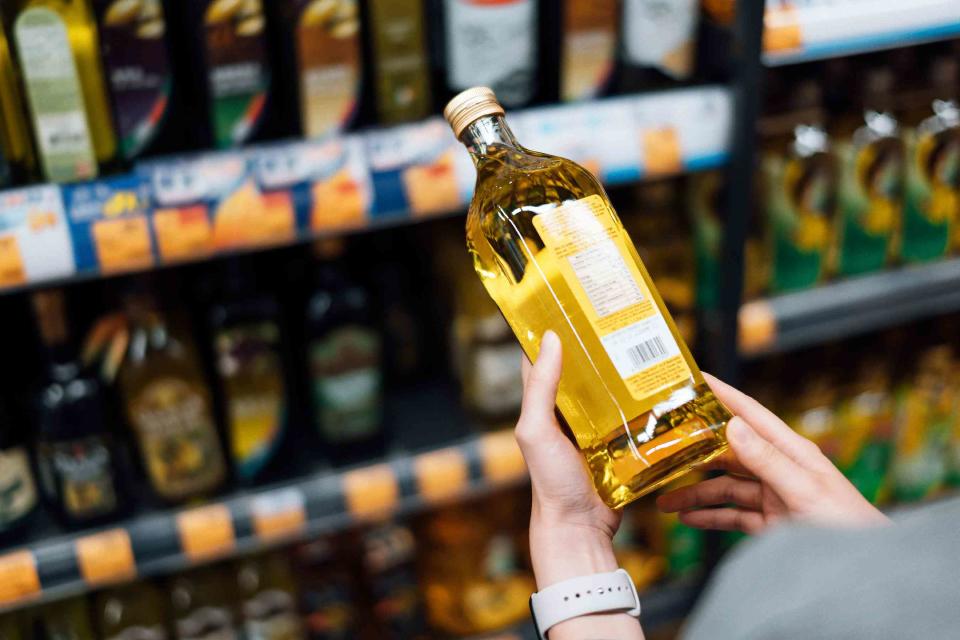Why Olive Oil Is About to Get More Expensive
It's not just olive oil quantity that droughts and heatwaves will impact either.

Yiu Yu Hoi / Getty Images
Experts are warning that olive oil could join the list of kitchen staples seeing a price hike this year.
Droughts and intense heat ravaged olive-producing regions across Europe in 2022, causing a poor harvest season that will likely see supplies dwindle.
Major olive oil-producing and exporting countries like Italy, Greece, Spain, and Portugal are projecting lower bounties. Italy alone, the world's second-largest olive oil producer, is expected to produce 37% less oil from the 2022/23 season compared to last year, according to the Institute of Services for the Agricultural and Food Market.
Dusan Kaljevic, CEO of Filippo Berio U.S., tells Food & Wine, "Filippo Berio estimates that the global harvest will deliver only about 2.6/2.7 million metric tons of product — 400,000 metric tons less than a typical good harvest." He adds, "We are projecting 20% less final product, which will result in 30%-50% price increases, depending on the type of oil."
Related:This Is Why Eggs Are So Expensive Right Now
According to The Copernicus Climate Change Service, "Europe saw its hottest summer ever recorded…and several prolonged and intense heatwaves affected parts of western and northern Europe." It added, "The continent experienced its second warmest June ever recorded at about 1.6°C (34.88°F) above average and its warmest October, with temperatures nearly 2°C (35.6°F) above average."
Casey Corn, olive researcher and culinary consultant, tells Food & Wine, "the changing climate is absolutely going to result in the volatility of olive production." She continues, "With uncertain temperature patterns and weather events increasing in intensity, our crops aren't facing the same predictable environments that we've built infrastructure and businesses around."
It's not just olive oil quantity that droughts and heatwaves will impact either. Corn shares that environmental changes can affect olive oil's taste too.
"That's why the concept of terroir, that the environment a crop is grown in is fundamental to its flavor, is so meaningful, and why we protect it with certifications like AOP, DPO, DOC, etc.," Corn says. She continues, "For the larger olive oil producers, smaller crops may mean they need to import more olives from different locations, which will also impact the resulting flavor."
To rectify the situation, Filippo Berio, one of Italy's top-selling brands for olive oils, is investing in and integrating sustainable initiatives to help ensure a reliable source of quality olive oil.
"Through research, we promote olive biodiversity that cultivates multiple varieties, including ancient and underutilized ones, to uncover productive cultivars that better tolerate climate extremes and exhibit resistance to pathogens," Kaljevic says. "Already, 18 underutilized varieties have shown high resilience."
Other olive oil companies are expressing their reactions to the poor harvest too. Jennifer LeClair, vice president of purchasing and operations at Pastene, shares that climate change's unpredictability is the hardest part for importers and growers.
"An action that would help is stronger innovation and implementation of state-of-the-art irrigation systems," LeClair says. "Growers will need stronger investments in irrigation technology for when the weather isn't cooperating and best for olive growth."
If we have learned anything from the recent egg fiasco, it's that investing in solutions and research to protect farmers and crops is necessary. Corn advises, "We are going to have to be more proactive in changing how we live on this planet. Implementing green policies and renewable energy infrastructure is of the utmost importance."

